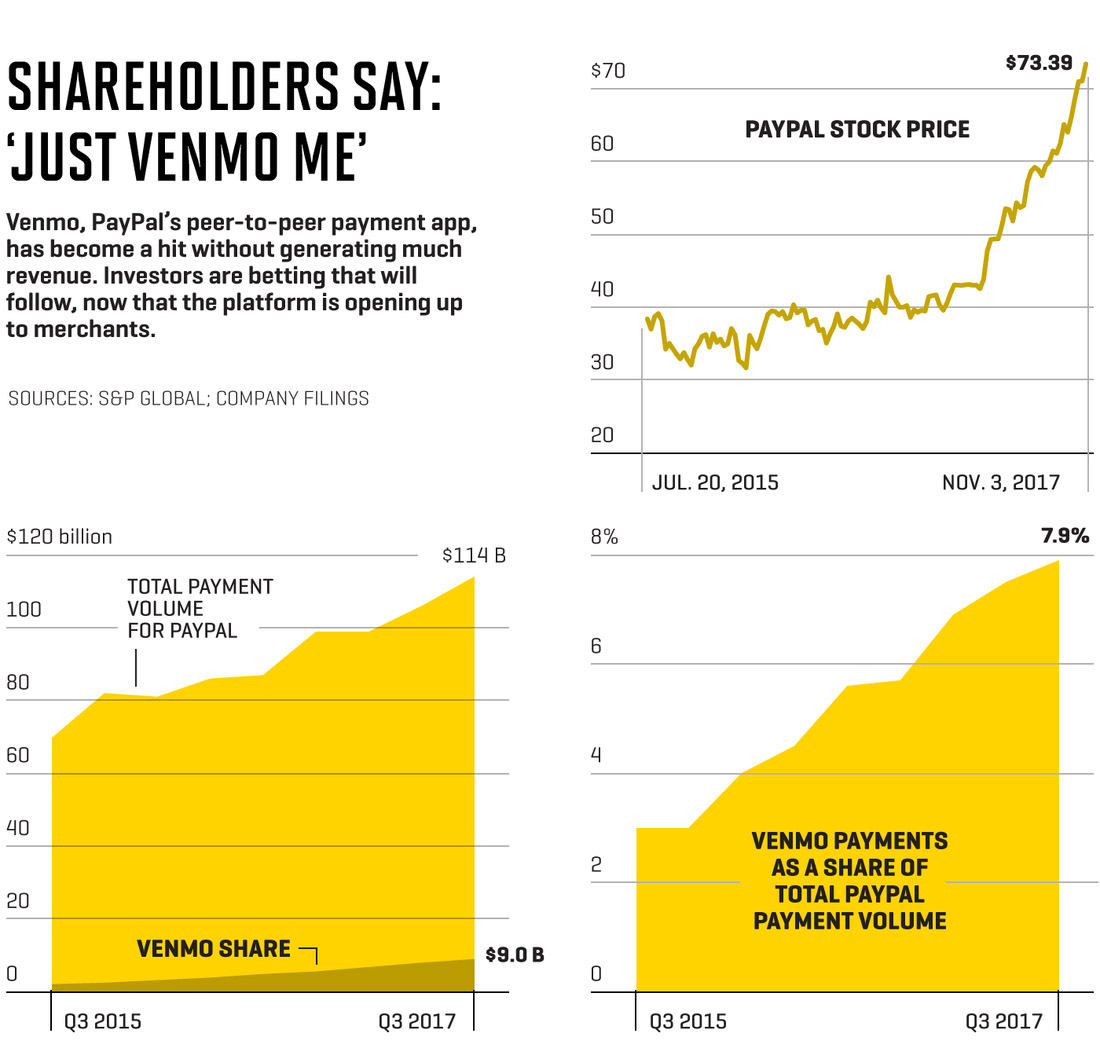貝寶CEO談Venmo:別浪費它的“特殊魔力”
|
直到不久前,,貝寶首席執(zhí)行官丹·舒爾曼在硅谷最響的名頭還是新澤西來的新人,,喜歡穿牛仔靴。而今,,讓他更為人所知的是對這家經典支付公司的領導,。貝寶是少數幾家不僅生存下來而且蓬勃發(fā)展的互聯網寵兒之一(2002年上市后不久貝寶成為eBay的子公司,2015年又被剝離了出來),。 在獲得獨立的貝寶擔任掌門人之前,,舒爾曼曾先后在美國運通和Sprint任職,還創(chuàng)立了Virgin Mobile,,并擔任CEO,。進入貝寶后,他做出了一些精明決策,。實際情況證明,,開放貝寶平臺以便Facebook等大公司打造自己的支付軟件是個明智之舉,這讓更多消費者把貝寶設為他們的默認支付渠道,。在他的領導下,,舒爾曼上任前收購的公司也有了令人矚目的成長。特別是很受80,、90后歡迎的P2P支付應用軟件Venmo,,它已經逐步實現了業(yè)績承諾。舒爾曼最近披露了把Venmo推廣給數百萬商家的計劃,。這很重要,,原因是Venmo的大約1000萬長期用戶都不用支付手續(xù)費,而商家是需要支付費用的,,這樣貝寶就能把Venmo的普及性轉化為新增收入,。 舒爾曼說,所有這些因素將會進一步加深人們對貝寶增長速度的深刻印象,。上一個財務年度中,,貝寶實現收入108億美元,同比增長17%,??紤]到有那么多新的金融科技公司和這家老牌支付企業(yè)競爭,這樣的業(yè)績顯得尤為出色。 |
Until recently, PayPal CEO Dan Schulman was best known in Silicon Valley as the New Jersey newcomer who liked to wear cowboy boots. These days he’s more renowned for his leadership of the iconic payments company—one of few dotcom-era darlings that not only survived but flourished. (Shortly after going public in 2002, PayPal became a subsidiary of eBay; in 2015 it was spun back out.) Since coming on board to run the newly independent company, after stints at American Express, Sprint, and Virgin Mobile—where he was the founding CEO—Schulman has made some shrewd bets. Opening up PayPal’s platform so that other big players, like Facebook, can build upon its payments software has proved to be a savvy move, enabling more consumers to make PayPal their default payment option. And acquisitions that predate Schulman’s arrival are also showing impressive growth under his guidance. In particular, Venmo, a peer-to-peer payments app popular with millennials, is starting to deliver on its -promise. Schulman recently announced plans to roll it out to millions of merchants. That’s important because most of Venmo’s estimated 10 million regular ?users don’t pay transaction fees—but merchants will, so PayPal can convert its popularity into more revenue. Schulman says all of these factors will help ?PayPal build on its already impressive growth: Last fiscal year, the ?company’s revenue came in at $10.8 billion, up 17% from the year before. That’s especially remarkable when you consider the crowd of new fintech players competing with this incumbent. |

丹·舒爾曼 在2017年年度商業(yè)人物榜上排名第8位 | 由Robyn Twomey為《財富》雜志拍攝
|
《財富》雜志資深撰稿人米甲·勒維-拉姆采訪了舒爾曼(沒錯,,他穿著牛仔靴),,以更多地了解貝寶的業(yè)績增長動力以及他對這家支付行業(yè)代表企業(yè)有何計劃。以下是經過編輯的采訪內容: 讓我們從Venmo開始,。我覺得很多人仍然想知道它怎么賺錢,? 讓我用最簡單的方法描述一下:貝寶剛開始是一家P2P服務商,隨后被eBay收購,,成為eBay的支付渠道,。后來eBay又把它剝離了出來。現在我們87%的業(yè)務量來自eBay以外的商家服務,。 Venmo[也]從P2P服務開始,,或者說實際上更像是一種社交支付“體驗”,因為所有人都會給他們的東西加上標簽,,寫下簡短的注釋和表情符號——90%[的交易]都[在Venmo的推送消息中]得到了分享,。 哇,你是說Venmo上90%的交易都是公開的,? 對,,這確實是一種社交體驗。人們會在Venmo上看自己的朋友們在干什么,,去了哪里,,跟誰一起出去玩。大多數評論都相當精彩和有趣,。我自己也會這樣看Venmo上的推送消息,。 接下來開放Venmo就變得合情合理,讓它具備更多功能,。也就是說,,如果現在用它的話,你會發(fā)現自己可以輕松地分東西,,可以付房租,。但如果還能用Venmo買東西,然后跟別人分一下,,或者把買了什么告訴自己的朋友,,那不是很好嗎? 因此,,我們現在把這項功能推廣給了美國的200萬商家,,讓他們接受Venmo。我們就是這樣通過貝寶變現的,,對Venmo我們也準備這樣做。順便說一下,商家對此非常興奮,,因為從他們那兒買的東西會得到推送,,而且人們可能會說:“嘿,我買了個很酷的東西,?!鄙碳揖拖矚g這樣的宣傳。 Venmo的社交性會打開其他收入渠道嗎,,比如廣告,? 有可能。Venmo有特殊的魔力,。我們基本上不在上面打廣告,。它的增長完全來自傳播。眼下出現了網絡效應,,原因是它已經變得非常有吸引力,,大家都想讓別人加入進來,這樣就可以給他們轉賬了,。 我覺得應該非常謹慎的對待這樣的體驗,。我想這樣的體驗需要和Venmo的哲學保持一致,而且對用戶來說要非常愉快,。通過給Venmo用戶創(chuàng)造更多價值來變現對我而言極為合理,。但對于其他更具有干擾性的變現方式,比如廣告什么的,,我真的還在考慮之中,。 有這么多交易得到共享讓你感到意外嗎?它反映了Venmo用戶群體的哪些情況,? 想想80,、90后,他們成長的時代和我截然不同[舒爾曼59歲],。私人和公開的界限要模糊得多,。他們想跟朋友們分享一切并不讓我感到意外。 Venmo不[光]是一種支付工具,,它更多的是一種體驗,,這就是它的秘方。許多人都說:“噢,,現在有很多種P2P服務,。”確實如此,,而且這個市場正在飛速增長,。但本質上,,Venmo的社交屬性要強得多。人們在Venmo上看推送消息的時間超過了真正進行支付的時間,。 既然支付領域有這么多的參與者,,你怎么保持Venmo和貝寶的位置呢? 我覺得有三點很重要,。第一是數字支付才剛剛起步,。目前的P2P規(guī)模介于350-400億美元,預計5-10年后將達到3500億美元,。所有這不是一個贏家通吃的市場,。 其次,我們的平臺已經同時向品牌服務和非品牌服務開放,。那些被外界普遍視為我們競爭對手的人現在是我們非常密切的合作伙伴,。比如Facebook,他們的許多支付活動都是通過我們的平臺進行的,,Apple Pay也有一半的交易通過我們的平臺,。大型銀行正在向他們的用戶推薦貝寶。這樣,,競爭環(huán)境對我們來說就會逐漸變得有利起來,,而不是壓迫我們。 第三,,支付其實很困難,。首先,你[需要]像變魔術那樣讓一個雙向網絡變得有規(guī)模,,因為如果一項服務只有幾百萬用戶,,就沒有商家會有時間做整合以及編碼工作。如果只有一百萬左右的商家在使用,,也不會有消費者去了解這種新的支付途徑,。所以需要上規(guī)模。一旦有了規(guī)模,,就像Venmo和貝寶,,就會出現網絡效應。我們有1700萬商家,,2.18億用戶,。我們的新用戶同比凈增速度接近90%。 |
Fortune’s Michal Lev-Ram caught up with Schulman (yes, he was wearing the boots) to find out more about what’s driving PayPal’s performance and what his plans are for the payments icon. An edited transcript follows: Let’s start with Venmo. I think a lot of people still wonder, “How does it make money?” I’ll give you the simplest analog: PayPal in its early days was a peer-to-peer service. Then it was bought by eBay, and it became a payment method for eBay. And then it started moving off eBay, and now 87% of our volume is merchant services outside of eBay. Venmo [also] started as a peer-to-peer service, or really more of a social payments “experience,” because everyone tags their stuff and puts in little notes and emojis—90% of [transactions] are shared [on Venmo’s news feed]. Wow, did you just say 90% of Venmo transactions are public? Yes, it’s really a social experience. People open the app to see what their friends are doing, where they’re going, who they’re hanging out with. Most of the comments are pretty amusing and fun. I open the feed to do that myself. The next step logically is to open up the application to more functionality. So if you use it today, you know that you can split things easily, you can pay your rent. But wouldn’t it be nice to be able to use your Venmo to buy things, too, and then to split that purchase or to tell your friends about it? So we have now opened the ability for 2 million merchants in the U.S. to accept Venmo. That’s exactly how we monetized PayPal, and that’s exactly what we’re going to do with Venmo. And by the way, the merchants are so excited about it because the purchase gets to go into your feed, and you can say, “Hey, I bought this cool thing.” They love that. Does the social aspect of Venmo open the door to other revenue streams, like advertising? Possibly. There’s a special magic to Venmo. We do pretty much no advertising around it. Its growth is all viral. There’s a network effect right now because it’s so big that you just want people to be a part of it so you can send them money. I want to be very careful with the experience. I think the experience needs to be in keeping with the Venmo philosophy, and it’s got to be fully delightful for those who are using it. Monetizing by creating more value for a Venmo user makes a ton of sense to me. But other forms of monetization that are more intrusive, like in advertising or something like that, the jury is really still out for me. Does the fact that so many of the transactions are shared surprise you? What does it say about Venmo’s user base? If you think about the millennial generation, they grew up in a very different era than I did. [Schulman is 59.] The boundaries between private and public are much more blurred. And it’s not surprising to me that they want to share with all of their friends. It is the secret sauce of Venmo that it isn’t [just] a payment; it’s more of an experience. A lot of people say, “Oh, there are a lot of peer-to-peer services out there.” There are, and it’s an exploding market. But Venmo is much more social in its nature. The app is opened more times to look at feeds than it is to do an actual payment. How do you maintain your position, both with Venmo and PayPal, now that there are so many other players in payments? I think there are three important things. One is that we’re in the infancy of digital payments. Peer-to-peer is between $35 billion and $40 billion today, and in five or 10 years it’s supposed to go to $350 billion. So this isn’t going to be a winner-take-all market. Second, we’ve opened up our platform to give both branded and unbranded services. And people who everyone thought would compete with us are now very close partners. Like Facebook—many of their payment ?initiatives are done through our platform, and 50% of Apple Pay comes through our platform. The big banks are marketing PayPal to their subscribers. So over time the competitive environment has become more benign for us than aggressive. Third, payments are just really hard. First of all, you magically [need to] make a two-sided network to appear at scale, because no merchant’s going to take the time to do integration and coding when there’s only a couple million users, if that, on a service. And no consumer is going to learn a new payment methodology if only a million or so merchants are using that payment. So you need to have scale. And once you have scale, like Venmo and PayPal do, you get a network effect. We have 17 million merchants. We have 218 million consumers. Our net new accounts are growing by nearly 90% year over year. |

|
你們的另一項業(yè)務是Xoom,,它讓用戶實現跨境支付。這個市場有多大,,你是否擔心它會受到政治氣候的影響,? 這個市場非常大,,規(guī)模達到6000億美元。對許多發(fā)展中國家的GDP來說,,它都難以置信地重要?,F在,各種各樣的中間人平均收取匯款額的8%-10%,。如果完全以電子方式進行,這個數字也許能降到3%-4%,。而且你仍有可能獲得巨大的利潤,,同時節(jié)省300億美元資金,這筆錢有可能讓數千萬人擺脫貧困,。 所以我們[2015年]推出Xoom的原因之一就是這個市場非常大,。另一個原因則是我們的效率要高得多,而且更安全,、更快,、價格更低。這對消費者來說是一種非常棒的價值主張,。而且我們覺得顛覆這個市場的時機已經成熟,。 那么在政治層面,有理由擔心資金流向其他國家會遇到某種監(jiān)管障礙嗎,? 政治環(huán)境非常難以預測,。我覺得企業(yè)不能只是作壁上觀。我覺得對于我們相信的價值,,我們得成為它的一股力量,。我們需要和政府以及監(jiān)管機構合作。同時我們需要把自己的資源用于應對公共部門無法單獨對付的情況和問題,。 許多人都說我是維權型CEO,。我只是覺得我是負責人的企業(yè)領導者。北卡羅萊納州頒布HB2法案[禁止變性者根據自己認同的性別選擇公共洗手間和更衣室]后,,我們是第一家退出該州的公司,。這讓我受到了很多人身威脅。所以我覺得站出來表示反對并不容易,,而且這個環(huán)境的政治色彩很濃,。但我認為我們不能拋棄自己的責任。 我們的使命具有非常大的包容性,。我們要讓金融服務民主化,。管理和轉移資金應該是所有民眾的權利,而不是富人的特權,。它屬于所有民眾,,屬于所有種類的人,。也就是說,這個世界應該容不得以任何理由來歧視任何人的行為,。(財富中文網) 本文將作為我們年度商業(yè)人物特輯的一部分刊登在2017年12月1日出版的《財富》雜志上,。 譯者:Charlie 審校:夏林 |
Another piece of your business is Xoom, which enables people to send payments back home to other countries. How big of a market is that, and do you worry it could be impacted by the political climate? It’s a very large market: $600 billion. And it’s an incredibly important part of the GDP of many developing countries. On average today, between 8% and 10% of the remittance is taken by various middlemen. If you can do it all electronically, you can do that at maybe 3% to 4%. And you could still make a great profit on it, but save $30 billion, which could lift tens of millions of people out of poverty. So the reason we bought Xoom [in 2015] is, one, it’s a very large market. But, two, we can do things much more efficiently, more secure, faster, less expensive. That’s a great value proposition to a consumer. And we feel it’s a market that’s ripe for disruption. And on the political part of the question, is there any reason for concern that there will be some kind of regulatory hurdles put in place for money flowing out to other countries? It’s so hard to predict the political environment. I think that business can’t sit on the sidelines and just watch. I think we need to be a force for the values that we believe in. We need to partner with government and regulators. But we need to bring our resources to bear against issues and problems that the public sector won’t be able to do by itself. A lot of people say that I’m an activist CEO. I just think I’m a responsible leader of a business. When HB2 [a law that prevents transgender people from using bathrooms corresponding to the gender with which they identify] was introduced in North Carolina, we were the first business to pull out. I received a lot of personal threats as a result of it. So I think it’s not easy to stand up, and the environment is very politically charged. But I don’t think we can abdicate our responsibility. Our mission is a very inclusive one. It’s to democratize financial services. Managing and moving money should be a right for all citizens, not a privilege for the affluent. It’s all citizens, all types. Which means that there should be no room in the world for discrimination against anybody for any reason.? A version of this article appears in the Dec. 1, 2017 issue of Fortune as part of our Businessperson of the Year package. |













